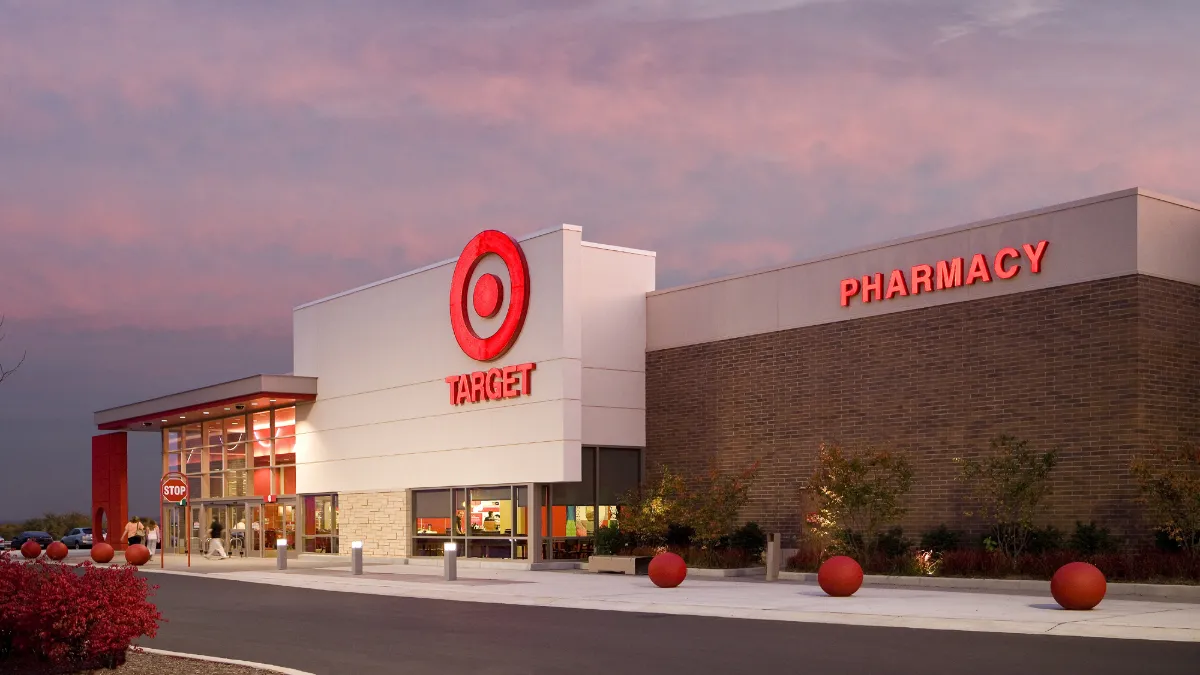Dive Brief:
- Target capped off the fiscal year on Tuesday with strong fourth-quarter results driven by its blockbuster holiday sales performance. The retailer recorded $15 billion of sales growth in 2020, higher than the company's total sales growth over the past 11 years, according to a company press release.
- Total net sales in 2020 reached $92.4 billion, while comparable sales rose 19.3%. For the fourth quarter, comparable sales grew 20.5%, with traffic growth of 6.5% and average ticket up 13.1%. The company's revenue for Q4 rose 21.1% year over year to $28.3 billion from $23.4 billion.
- Target also said it would annually invest about $4 billion to launch more stores, update existing ones and improve online fulfillment. The company intends to continue this investment over the next couple of years.
Dive Insight:
As other retailers temporarily closed during the early days of the pandemic, Target gained more market share (about $9 billion, according to the company) as shoppers looked to minimize multiple shopping trips and get everything that they needed in one place.
The retailer saw strong holiday results for 2020, especially on its digital front — potentially due to shoppers that wanted to avoid crowds. Digital comp sales rose 102% in November and December, while store comps rose 4.2%. Digital was a big winner for Target for the whole year: Sales through that channel grew by nearly $10 billion in 2020, thanks to a 235% increase in Target's same-day services. In the fourth quarter alone, digital comps were up 118%, led by 500% growth in Drive Up.
Though Target had already posted promising holiday results ahead of Q4, its sales ballooned even further in January when stimulus checks began filling the bank accounts of Americans.
During its earnings call, the company touted its goal of becoming "America's easiest place to shop." With its multi-channel shopping and fulfillment options, Target Chairman and CEO Brian Cornell said the convenience is instrumental to gaining customer loyalty and trust.
"This performance is further proof that we built a business model that is working as intended when it puts Target in a category of its own," Cornell said on the call. "The enormous investments we made in supply chain, store operations and technology capabilities are already powering exponential growth in digital commerce."
And there are more investments to come, with the mass merchant's plans to invest $4 billion annually in stores and supply chain. Target fulfilled 95% of its fourth quarter sales in stores, the company said on the call, which is why the retailer worked to replenish its inventory at an increased rate. In the coming months, the company is also expanding its pickup options in categories such as apparel and fresh food.
In recent years, Target has been steadily increasing its product offering through private labels and brand partnerships, cementing its identity as a one-stop-shop. Some of its recent initiatives have begun showing prospects, and the pandemic certainly hasn't slowed the company from forming ties with other brands.
A little over a year after Target launched All in Motion, positioned to compete with Lululemon and other athletic apparel brands, the private label managed to generate $1 billion. Target has also recently partnered with tech giant Apple and beauty giant Ulta to open dedicated shops in select Target stores.
Despite the strong growth, Neil Saunders, managing director of GlobalData, said these results will soon slow, though it "is not a sign of failure or weakness; it is a simple recognition that some of the pandemic-induced trends that fueled spending will unwind." Saunders added that, "The tactic for the company appears to be one of taking a forensic look at certain categories and plotting ways to engineer growth – something it has so far done with the Apple and Ulta partnerships in electronics and beauty, respectively."
The company said in the call that it plans to open new warehouses and expand robotics capabilities to keep up with the demand. It also plans on double down on its commitment to sustainability and improve its relevance to Black guests.
While Target declined to provide sales estimates for the future, competitor Walmart said it expects sales to slow in 2022 after pandemic-driven sales begin to dial down.
"A $15 billion increase in revenue for the full-year with stable margins is staggering, particularly when core competitors Walmart and Amazon are also running on all cylinders," said Moody's retail analyst for Target, Charlie O'Shea. "While Target did not provide guidance for 2021, we believe its foundation has strengthened to the point that it will continue to excel regardless of the environment."















